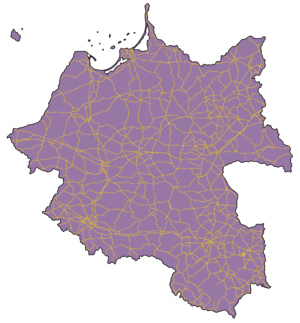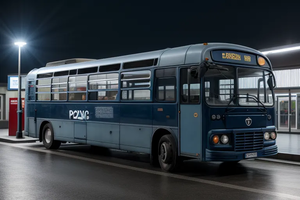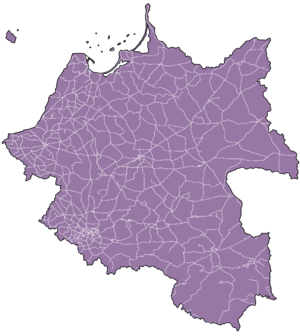Transport in the PSNR

Minister:
 Jerzy Sosnowski
Jerzy SosnowskiPart of:
 The Polish Social Naionalist Republic
The Polish Social Naionalist RepublicThe infrastructure of the Polish Social Nationalist Republic (PSNR) features a mixed system dominated by public transportation alongside a significant private sector. Numerous highways crisscross the country, linking cities and towns, while rail connections, though less common, are extensive and connect key hubs. The PSNR has made efforts to reduce car usage by providing extensive public transportation alternatives and implementing road tolls on highways. Although car usage remains prevalent, each generation sees about a 7% decrease in drivers.
The PSNR public transportation network, known as the "bus-metro system," was established in 2028 and designed by Kultokrat and then-Minister of Economy Maciej Poterek. The country also boasts several international airports, with Warsaw Chopin Airport being the largest and serving as the main global hub for LOT Polish Airlines. Along Poland's Baltic coast, seaports facilitate freight operations, with major ports located in Klaipėda, Kaliningrad, Gdynia, Gdańsk, Baltiysk, Elbląg, and Nowe Pomorze.
Bus-Metro system


The Bus-Metro System was established through legislation passed by the Sejm in 2028, initiating a massive reconstruction effort across the country's cities and highways that lasted until approximately 2037. Rather than a traditional law, the legislation was essentially a multi-year infrastructure reform plan. The plan mandated the addition of a dedicated bus lane to each highway, separated by a barrier, and required every city with over 90,000 inhabitants to develop at least a rudimentary metro system. Prior to this reform, Warsaw had the only metro system in the PSNR, necessitating widespread construction and modifications that accounted for the nine-year implementation period.
The purpose of the Bus-Metro System was to provide free short-range transport via metros and free long-range transport via buses, while rail transport remained a paid service due to its higher speed and comfort. The dedicated bus lanes on highways are accessible to all public buses and to private buses from firms that have obtained a special certification. The subscription price for this certification is set by the Ministry of Infrastructure and varies based on estimated average traffic levels in the bus-only lanes nationwide.
At bus stops and city entrances, the bus lanes merge with regular roads, where road guards verify bus documentation to ensure subscription compliance. This verification process is quick, as guards use scanners connected to a database, requiring only a paper code scan. The dedicated bus lanes aim to provide public transport with a means to bypass private vehicle traffic, thus offering a more attractive alternative for commuters.
Rail transportation

Railways in the PSNR aim to connect the main hubs of the country, offering a paid, more luxurious, and faster alternative to buses. Train trips can be paid for either by purchasing a ticket for a specific journey or by obtaining a Train Card, which allows unlimited travel across the country. The Train Card can be acquired at local transportation offices or railway stations, with the subscription fee deducted monthly from the user's income. The Train Card is free for individuals under the age of 20. Ticket inspectors on trains check passengers' tickets or Train Cards.
Since the establishment of the PSNR in 2027, there have been three major railway expansions. From 2028 to 2032, railway lines were established connecting Poland, Kaliningrad, East Galicia, and Eastern Belarus. In 2037, the railways in central-eastern Poland were expanded to address the imbalance in railway quality between northwest Poland and the east, and to improve the supply situation in anticipation of the Eastern Crisis potentially escalating into full-scale war. In 2039, railway lines between Kaliningrad and Eastern Belarus were connected to the railways in Wilno Voivodeship and Western Belarus.
Road Guards

In the PSNR, the Road Guard is responsible for enforcing road rules for private transportation (both for firms and individuals) and public transport, ensuring compliance. The Road Guards operate independently from the police in the PSNR, as the police typically do not enforce traffic regulations. However, if police officers witness a road violation while on duty, they are obliged to address it, even though traffic enforcement is not their primary responsibility.
The Road Guards also have the authority to arrest or penalize police officers who violate road rules. Their vehicles are distinguishable by the green color and the flag of the Ministry of Infrastructure displayed on their doors.
Registration Plates
Each powiat is identified by a distinct four or five letter code, where the first letter signifies the powiat's kraj (autonomous country), the second letter represents the powiat's voivodeship (province), and the third and fourth letters denote the specific powiat. In certain regions, powiats are further divided into gminas (municipalities). In car registration plates, an additional fifth letter is added to the code to indicate the gmina. Kraj codes are as follows:
- Crown - P
- Baltic Archipelago Kraj - B
- Kashubia Kraj - K
- Silesia Kraj - S
- Kaliningrad Kraj - R
- Belarus Kraj - E
- Rusynia Kraj - U
- Bornholm Kraj - O
Voivodeship codes are as follows:
- Pomeranian Voivodeship - P
- Kuyavian Voivodeship - K
- Greater Poland Voivodeship - W
- Mazuria Voivodeship - M
- Masovia Voivodeship - A
- Podlasie Voivodeship - O
- Wilno Voivodeship - I
- Łódź Voivodeship - Ł
- Holy Cross Voivodeship - Ś
- Lublin Voivodeship - L
- Western Galician Voivodeship - Z
- Eastern Galician Voivodeship - G
- Lwów Voivodeship - Ó
- Tarnopol Voivodeship - T
- Westislander Voivodeship - E
- Capitalislander Voivodeship - N
- Puck Voivodeship - ù
- Kartuzy Voivodeship - R
- Kościerzyna Voivodeship - ò
- Częstochowa Voivodeship - C
- Katowice Voivodeship - Q
- Oppeln Voivodeship - X
- Urban Voivodeship - D
- Rural Voivodeship - S
- Srpsgród Voivodeship - J
- Klajpedia Voivodeship - Y
- Pinsk Voivodeship - U
- Luninets Voivodeship - F
- Lida Voivodeship - H
- Svaljava Voivodeship - V
- Hust Voivodeship - B
- Rahowo Voivodeship - Ź
- Bornholm Voivodeship - Ø